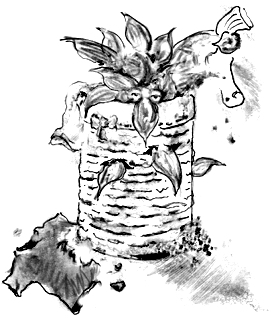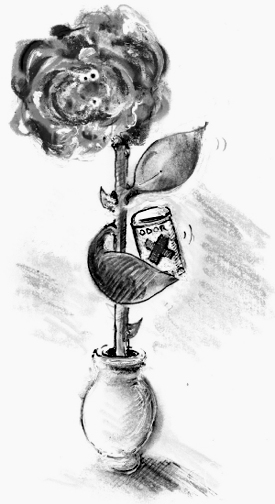excerpts from Attack of the Killer Asparagus
And Other Lessons Not Learned in the Garden
by Mike Nowak
Illustrated by Allyson Hunter
Dismayed in the Shade
President Jimmy Carter once said that life is not fair. I'm not positive, but I don't think he coined that phrase. I'm not positive about this either, but I think he was referring to gardeners. I'll check LexisNexis when I have a spare decade.
The point is that not all gardeners are blessed with perfect growing conditions. (I haven't gone out on a limb here, have I?) Types of soil, water and asphalt paving can all be challenges to the success of our gardens, our personal esteem and hence, our very existence. At least, that's what I tell my therapist.
But nothing is more of a stick in the spokes of horticulture than that Ol' Debil Shade. Yep, shade is the deal breaker. It's the one that separates the men from the yetis, the women from the, um, whatever they need to be separated from. Usually men sitting in front of a sporting event on TV.
(A quick digression. Why is it that I can type “biodiversity” and the writing program I use tells me that the word doesn't exist. But if I type the plural of “yeti” it doesn't blink. Based on that alone I fear for the future of the English language.)
|
 |
It's important to be able to identify the various levels of shade. The horticultural texts are always referring to “dappled shade.” Who are those people? Have they been spending their Sundays in the park with George? Are they looking at the world through dappled-shaded glasses? Real gardeners know that there is no such thing as “dappled shade.” In the real world, gardeners confront “3-flat shade,” “skyscraper canyon shade,” “can't see my trowel in front of my face shade,” “forget about it shade,” “not even a stalagmite will grow here shade,” “dark as an advertising executive's heart shade,” and “abandon hope all ye who enter here shade.” Not pretty choices, if you ask me.
As you can imagine, that puts a lot of pressure on the gardener to make sound plant choices. Heck, it puts a lot of pressure on plant growers to come up with varieties that can survive “can't see my trowel in front of my face shade.” Why haven't they been awarded MacArthur Genius Grants? Perhaps it's because the MacArthur people know that folks shouldn't be trying to garden where the light level is lower than under a rock on the dark side of the moon.
There are special tools that are needed to work in ubershady gardens. Your best friend is your flashlight. However, some people prefer the natural ambiance of Tiki torches. Others set their burning bushes on fire, which has a poetic resonance with me, especially since we've discovered that burning bushes can be invasive. Speaking of resonance, you might want to try a sonar device. And I don't say this just because I recently invested in a start-up company called Sonar Solutions for Shady Sites. On the other hand, if I can't interest at least a few of you in one of these techno-horticultural gadgets, my gluten-powered lawnmower is going to get repossessed. I'm just sayin'.
Of course, there can be no gardening without real, live plants. Actually, there can be, but I'm saving that for a day when I've run out of column ideas. And nothing says deep shade gardening like the much-maligned hosta. It used to be that hostas were hated because they were so plain. Now that there are more hosta varieties than there are actual hosta plants on the planet (I need to check LexisNexis about that), hostas are hated because they are not native to the U.S. You people are hard to please! What next? Hate hostas because they didn't invite you to their hosta party in sixth grade? Geez.
Let's just put it this way. A hosta will survive with less light shed on it than the workings of the average city council. Hey, I once grew a hosta at the bottom of a laundry hamper on an old T-shirt. Of course, I didn't put it there. It just showed up. And now, every time I open the lid, it says, “Feed me.”
Hmm. Maybe there is a reason to be suspicious of hostas. I'll check LexisNexis right after I feed Harry the Hosta another tube sock for lunch.
|
Scents and Non-Scents
Stand back! I'm about to have a Proustian moment.
Wait...wait. Whew! It went away. For a second I thought I was going to become sick and depressed and this column would suddenly expand to about four hundred thousand pages that none of you would ever read except if you were in a hospital recuperating from two broken legs and I would start writing sentences that ran on and on and people would call me a genius but it wouldn't matter because fewer than one person in a thousand would actually read this column but that wouldn't matter either because the mere act of writing a four hundred thousand page gardening column would cause me to go insane and...and...
What's that smell?
Marcel Proust once wrote, or perhaps he didn't and should have written somewhere in Remembrance of Things Past, a few thousand words about the sense of smell and the average garden.
Take the simple hyacinth. For some, this is the epitome of a spring fragrance. I say slap a skull and crossbones warning label on hyacinth plants, if only to protect those people who think that taking it indoors is a good idea. If you can smell a plant a block away outdoors, it's a clue that you're flirting with asphyxiation if you bring it into your living room.
Gardenias are pretty much in that same category. The good news about a gardenia plant, though, is that most of you in Zone 5 are never going to be able to keep it alive long enough for it to bloom anyway. Go ahead, try. You're more likely to get your cat to read The Sunday Times aloud to you than ever see your gardenia bloom. |
 |
The rose is an example of how genetic engineering is also keeping us safe from the perils of “rampant perfumication.” It used to be that roses didn't exactly die–they just weren't exactly healthy. But we loved our black-spot-and-powdery-mildew-covered-stick with the solitary pink rose perched precariously on top because we sniffed it every time we passed the plant. Of course, along with the delicate fragrance we sucked up a fair amount of fungicides, pesticides and the odd, bewildered aphid.
Enter Modern Science! (Cue the cheesy techno music.) We have now bred our roses to withstand the onslaught of insects, diseases and the 24-hour news cycle...without chemicals! (More cheesy techno music.) I'm not going to name names, pretty much because I don't have a lawyer on staff, but the new, improved roses give you perfect blooms, almost perfect leaves and not a whiff of fragrance. Now that's progress.
Not only that, but from what I can tell–and I'm not exactly a scientist, nor do scientists want to be seen in the same room with me–these roses are actually capable of stealing scents from other plants. Meaning that if you have an exquisitely scented lily planted next to a new age rose, the only scent that the lily will emit is something that you're likely to get from a stack of newspapers. For those of you who take offense because you wake up each morning, stagger out to your garage and inhale the strong fragrance of journalistic integrity that is piled to the ceiling where your car used to fit, well, I don't exactly apologize. Let's just say I was misquoted.
Journalists know what I'm talking about.
Garden scents even extend to the mulches we apply to our garden beds. There are many who relish the aroma of freshly-laid hardwood or bark mulch. I am, in fact, one of those people.
However, I draw the line at those cocoa shell mulches that so many chocoholics use in their flower beds. It's because...well, can I ask a question? Have any other gardeners awoken face down in a pile of cocoa mulch in their backyards? Can I see hands? No? Hmm. Okay. I withdraw the question.
Excuse me for a minute. I'm going online to see what my search engine says about Proust/cocoa mulch/psychosis. I'll get back to you.
|
Thanks to everyone who supported our Kickstarter. We made our goal and several hundred over! You'll be getting your premiums soon.
|
|

